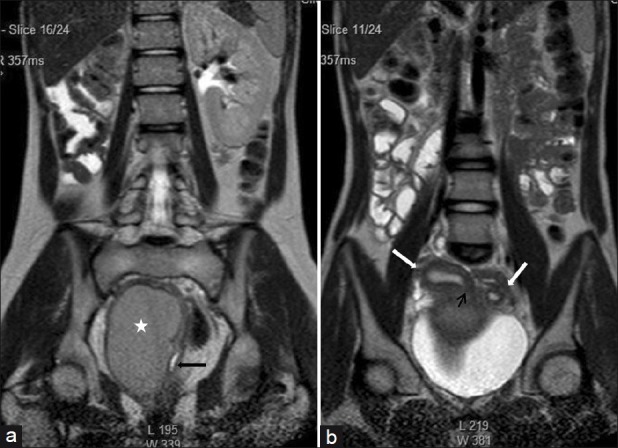OHVIRA
Editor-In-Chief: Prab R Tumpati, MD
Obesity, Sleep & Internal medicine
Founder, WikiMD Wellnesspedia &
W8MD medical weight loss NYC and sleep center NYC
| OHVIRA | |
|---|---|

| |
| Synonyms | Herlyn-Werner-Wunderlich syndrome |
| Pronounce | N/A |
| Specialty | N/A |
| Symptoms | Pelvic pain, dysmenorrhea, urinary tract infection |
| Complications | Endometriosis, infertility |
| Onset | Adolescence |
| Duration | Long-term |
| Types | N/A |
| Causes | Congenital Müllerian duct anomaly |
| Risks | None known |
| Diagnosis | Ultrasound, MRI |
| Differential diagnosis | Mayer-Rokitansky-Küster-Hauser syndrome, imperforate hymen |
| Prevention | N/A |
| Treatment | Surgical intervention |
| Medication | Pain management |
| Prognosis | Good with treatment |
| Frequency | Rare |
| Deaths | N/A |
Congenital condition affecting the female reproductive system
OHVIRA (Obstructed Hemivagina and Ipsilateral Renal Anomaly) is a rare congenital disorder that affects the female reproductive and urinary systems. It is characterized by a triad of anomalies: a double uterus (uterus didelphys), an obstructed hemivagina, and an ipsilateral renal anomaly, typically renal agenesis. This condition is also known as Herlyn-Werner-Wunderlich syndrome.
Anatomy and Pathophysiology[edit | edit source]
OHVIRA syndrome involves the malformation of the Müllerian ducts, which are embryonic structures that develop into the female reproductive tract. In OHVIRA, there is a failure of the ducts to fuse properly, resulting in a double uterus. One of the vaginas is obstructed, leading to hematocolpos (accumulation of menstrual blood) in the obstructed side. The renal anomaly, often renal agenesis, occurs on the same side as the obstructed hemivagina.
Uterus Didelphys[edit | edit source]
Uterus didelphys is a condition where a woman has two separate uterine cavities, each with its own cervix. This occurs due to incomplete fusion of the Müllerian ducts during embryonic development. In OHVIRA, one of these uterine cavities is associated with an obstructed hemivagina.
Obstructed Hemivagina[edit | edit source]
The obstructed hemivagina is a result of a transverse vaginal septum or other obstruction that prevents normal menstrual flow from exiting the body. This can lead to the accumulation of menstrual blood, causing pain and potential infection.
Ipsilateral Renal Anomaly[edit | edit source]
The renal anomaly in OHVIRA is typically renal agenesis, where one kidney fails to develop. This is due to the close embryological relationship between the development of the reproductive and urinary systems.
Clinical Presentation[edit | edit source]
Patients with OHVIRA often present during adolescence with symptoms such as pelvic pain, dysmenorrhea (painful menstruation), and a palpable pelvic mass due to hematocolpos. Some may also experience urinary symptoms due to the associated renal anomaly.
Diagnosis[edit | edit source]
Diagnosis of OHVIRA is typically made through imaging studies. Ultrasound is often the first-line imaging modality used to identify the presence of a double uterus and hematocolpos. Magnetic resonance imaging (MRI) can provide more detailed information about the anatomy of the reproductive tract and confirm the diagnosis.
Management[edit | edit source]
The primary treatment for OHVIRA is surgical intervention to relieve the obstruction of the hemivagina. This typically involves resection of the vaginal septum to allow normal menstrual flow. Post-surgical follow-up is important to ensure proper healing and to monitor for any complications.
Prognosis[edit | edit source]
With appropriate surgical treatment, the prognosis for patients with OHVIRA is generally good. Most patients experience relief from symptoms and can lead normal reproductive lives. However, the presence of a renal anomaly may require ongoing monitoring of renal function.
See also[edit | edit source]
Search WikiMD
Ad.Tired of being Overweight? Try W8MD's physician weight loss program.
Semaglutide (Ozempic / Wegovy and Tirzepatide (Mounjaro / Zepbound) available.
Advertise on WikiMD
|
WikiMD's Wellness Encyclopedia |
| Let Food Be Thy Medicine Medicine Thy Food - Hippocrates |
Translate this page: - East Asian
中文,
日本,
한국어,
South Asian
हिन्दी,
தமிழ்,
తెలుగు,
Urdu,
ಕನ್ನಡ,
Southeast Asian
Indonesian,
Vietnamese,
Thai,
မြန်မာဘာသာ,
বাংলা
European
español,
Deutsch,
français,
Greek,
português do Brasil,
polski,
română,
русский,
Nederlands,
norsk,
svenska,
suomi,
Italian
Middle Eastern & African
عربى,
Turkish,
Persian,
Hebrew,
Afrikaans,
isiZulu,
Kiswahili,
Other
Bulgarian,
Hungarian,
Czech,
Swedish,
മലയാളം,
मराठी,
ਪੰਜਾਬੀ,
ગુજરાતી,
Portuguese,
Ukrainian
Medical Disclaimer: WikiMD is not a substitute for professional medical advice. The information on WikiMD is provided as an information resource only, may be incorrect, outdated or misleading, and is not to be used or relied on for any diagnostic or treatment purposes. Please consult your health care provider before making any healthcare decisions or for guidance about a specific medical condition. WikiMD expressly disclaims responsibility, and shall have no liability, for any damages, loss, injury, or liability whatsoever suffered as a result of your reliance on the information contained in this site. By visiting this site you agree to the foregoing terms and conditions, which may from time to time be changed or supplemented by WikiMD. If you do not agree to the foregoing terms and conditions, you should not enter or use this site. See full disclaimer.
Credits:Most images are courtesy of Wikimedia commons, and templates, categories Wikipedia, licensed under CC BY SA or similar.
Contributors: Prab R. Tumpati, MD

